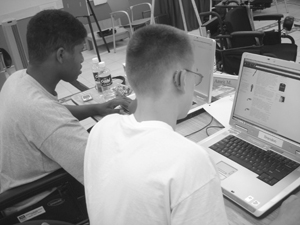Monitor and manage online discussions.

In a perfect world you could create an electronic distribution list or a web-based forum for protégés and mentors with guidelines for their interactions, and they would automatically communicate with one another appropriately and regularly. This is the essence of how a topical listserv/listproc discussion list typically works. However, in a mentoring community you have more specific goals for the participants than simply to discuss a common interest. Someone needs to be assigned the tasks of monitoring and managing the discussions of the mentoring community and sending discussion questions when needed to promote interactions. There are no formal rules to employ, but the person with that assignment can benefit from using the content in future chapters of this book as a guide.
After providing general guidelines and training to new mentors, introducing them, and encouraging them to send messages introducing themselves, the mentoring community administrator can send one short, engaging message on one topic at a time and allow time for discussion before sending out a message on another topic. The administrator can then monitor conversations and assure a natural flow of communication. Some messages are best sent by a specific mentor or protégé. In this case, the administrator can ask a specific participant to send the message to the group. This approach assures that discussions are dominated by mentors and protégés, not program staff.
Protégés should be encouraged to send messages with a focused subject line and a question related to their current experiences. For example, the administrator could encourage a participant to submit the following question to the group: "I'm applying for a summer job and need to send a résumé and cover letter. I expect I will need disability-related accommodations to succeed in the position available. Should I inform the potential employer of my disability now, wait until I get invited for an interview, or wait until I am offered the job?"
Developing good questions to discuss is essential. This book gives you some great examples, but you will want to develop your own and have your participants do the same. Program staff should view their role as community facilitators, not the central focus. To support a discussion, administrators can do the following:
- Use questions that are short, focused, open-ended, and of interest to most participants and that solicit a variety of opinions rather than one right answer.
- Rephrase or provide an example related to a question if participants seem confused.
- Use subject lines that specify the focus of the discussion, for example, "Disclosing a disability in employment?"Avoid vague subject titles like "Question from a mentor."
- Submit comments to keep a conversation going, but back off when participants are keeping the discussion lively by themselves.
- In private email messages, encourage mentors and protégés to submit questions to the group.
- Promote communications from participants. For example, after someone's contribution you might send a message such as one of the following: "What a great story, John. What did you learn from this experience?" "Sherry, could you share with the group more about how you applied for this scholarship?" "Tell us about what accommodations you're using on your new job." "How did the reaction of that teacher make you feel?" "If you had this to do again, would you take the same action?"
- Whenever possible, let the participants resolve their own disputes, and reprimand privately those who send inappropriate messages. Rarely is it necessary to send such a message to the whole group.